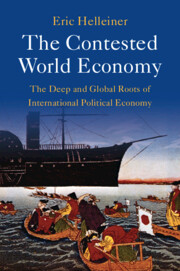Book contents
- The Contested World Economy
- The Contested World Economy
- Copyright page
- Dedication
- Contents
- Preface
- Abbreviations
- 1 Introduction and Overview
- Part I The Three Orthodoxies in a Global Context
- Part II Beyond the Three Orthodoxies
- 8 Autarkic Visions of Economic Self-Sufficiency
- 9 Environmentalist Calls for a More Sustainable Economic Order
- 10 Feminist Critiques of a Patriarchal World Economy
- 11 Pan-African Responses to a Racialized World Economy
- 12 Religious and Civilizational Political Economies of Pan-Islamism and Pan-Asianism
- 13 Distinctive Visions of Economic Regionalism for East Asia, Europe, and the Americas
- Part III Ending at a Beginning
- Works Cited
- Index
8 - Autarkic Visions of Economic Self-Sufficiency
from Part II - Beyond the Three Orthodoxies
Published online by Cambridge University Press: 20 April 2023
- The Contested World Economy
- The Contested World Economy
- Copyright page
- Dedication
- Contents
- Preface
- Abbreviations
- 1 Introduction and Overview
- Part I The Three Orthodoxies in a Global Context
- Part II Beyond the Three Orthodoxies
- 8 Autarkic Visions of Economic Self-Sufficiency
- 9 Environmentalist Calls for a More Sustainable Economic Order
- 10 Feminist Critiques of a Patriarchal World Economy
- 11 Pan-African Responses to a Racialized World Economy
- 12 Religious and Civilizational Political Economies of Pan-Islamism and Pan-Asianism
- 13 Distinctive Visions of Economic Regionalism for East Asia, Europe, and the Americas
- Part III Ending at a Beginning
- Works Cited
- Index
Summary
Although autarkic thought has not received much attention from IPE scholars, there is a long history of thinkers who prioritized their state’s economic self-sufficiency in order to enhance its autonomy (economic, political, and/or cultural) from foreign influence. This autarkic goal was rejected by classical economic liberals, neomercantilists, and most Marxists, but autarkic perspectives had at least as important a place in political debates as these other better-studied ones in some pre-1945 contexts. Like the other perspectives examined in this book, some strands of autarkic thought also circulated internationally in the pre-1945 era. This chapter identifies influential autarkic ideas developed by a number of thinkers from places as diverse as Britain (John Maynard Keynes, just briefly in 1933), China (Chen Gongbo), Germany (Johann Fichte, Friedrich Zimmermann), Haiti (Edmund Paul), India (Mohandas Gandhi), Japan (Aizawa Seishisai, Shizuki Tadao), Korea (Lee Hang-ro), Paraguay (José Gaspar Rodríguez de Francia), Russia (Peter Kropotkin), Turkey (Sevket Süreyya Aydemir), and the west African colony of the Gold Coast (Kobina Sekyi). The chapter also highlights important disagreements amongst these thinkers, ranging from the specific reasons they prioritized autonomy to their views of the relationship between autarky and peace.
Keywords
- Type
- Chapter
- Information
- The Contested World EconomyThe Deep and Global Roots of International Political Economy, pp. 125 - 140Publisher: Cambridge University PressPrint publication year: 2023

